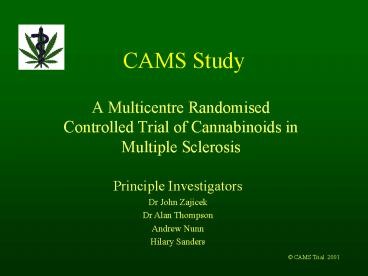CAMS Study - PowerPoint PPT Presentation
1 / 26
Title:
CAMS Study
Description:
90% of patients with Multiple Sclerosis (MS) will experience symptoms of muscle ... Mentioned in western medical textbooks from the 13th century onwards. ... – PowerPoint PPT presentation
Number of Views:40
Avg rating:3.0/5.0
Title: CAMS Study
1
CAMS Study
- A Multicentre Randomised Controlled Trial of
Cannabinoids in Multiple Sclerosis
Principle Investigators Dr John Zajicek Dr Alan
Thompson Andrew Nunn Hilary Sanders
2
Background - Multiple Sclerosis
3
Background - MS
- 90 of patients with Multiple Sclerosis (MS) will
experience symptoms of muscle spasticity and
spasms. - Current therapies for spasticity include
baclofen, tizanidine, dantrolene and diazepam. - All of these have significant side effects and
limited efficacy.
4
Background - MS
- Cannabis - widespread anecdotal reports of
beneficial effects on - spasticity
- tremor
- urinary disturbance
- pain.
5
Background - MS
- Only two previous attempts at randomised double
blind controlled studies of cannabinoids in total
of 22 patients. - Petro and Ellenberger, 1981
- 9 patients, 3 days.
- THC, double blinded crossover design
- significant reduction in spasticity score.
6
Background - MS
- Ungerleider et al, 1988
- 13 patients, up to 6 weeks
- THC, double blinded crossover design
- significant reduction in patient rating of
spasticity. - Thus probably beneficial effect, but too small to
generalise.
7
Background - Cannabis
8
Background - Cannabis
- Cannabis sativa - Cultivated Cannabis
- Many uses
- Rope
- Canvas
- Clothing
- Paper
- Medicinal
9
Background - Cannabis
- Medicinal use for over 2000 years.
- First in the far east.
- Mentioned in western medical textbooks from the
13th century onwards. - The peak in its use was in the 19th century.
10
Background - Cannabis
- Indications in 19th century.
- Dysmenorrhoea
11
Background - Cannabis
- Other Indications.
- Pain
- Cramps
- Fever
- Vomiting
- Asthma
- Epilepsy.
12
Background - Cannabis
- Also psychoactive properties.
- Recreational use.
13
Background - Cannabis
- Fell out of use in early 20th century
- concern over its recreational use
- inconsistency in its preparation and absorption
- poor storage stability
- Formally banned in 1928
- Remained prescribable until 1971.
14
Background - Cannabis
- Over 60 aromatic hydrocarbon compounds known as
cannabinoids. - Pharmacological effects mediated through
cannabinoid receptors - CB1 receptors are found widely in the nervous
system - CB2 receptors predominantly on B lymphocytes.
15
Background - Cannabis
- THC - most important active cannabinoid.
- Available synthetically.
- Prescribable for nausea as nabilone.
16
Background - Cannabis
- 1998 - House of Lords Select Committee report -
Cannabis, the scientific and medical evidence. - Positive about medicinal use.
- Advised further research before rescheduling of
the drug.
17
Trial Design
18
Trial Design
- Multicentre randomised controlled trial.
- Comparing THC, cannabis oil and placebo.
- Coordinated from Plymouth
- Derriford will recruit approximately 100 patients
- 560 patients distributed across about 20 other
centres nationwide.
19
Trial Design - Centres
20
Trial Design
- Two Phases
- Weeks 1-16
- All patients on drug
- Seven clinic visits
- Weeks 17-52
- Patient chooses whether to continue drug
- Three clinic visits
21
Trial Design
22
Primary Outcome Measures
- Ashworth Scale
- 5 grade assessment of spasticity on clinical
examination. - Rather coarse steps.
- Rather subjective.
- Reasonable inter- and intra- rater reliability.
23
Secondary Outcome Measures
- Timed 10m walk
- Rivermead Mobility Index
- UK Neurological Disability Status Scale
- GHQ-30 (a quality of life questionnaire)
- Barthel Index (a measure of activities of daily
living) - 9 further category rating scales.
24
Blinding
- Risk of unblinding of patient due to widely known
side effects. - Two study personnel.
- Treating physician
- Assessor (physician or physiotherapist)
- Degree of unblinding assessed at the end of the
trial.
25
Results
- Recruitment will start at beginning of 2001.
- Recruitment expected to last about 1 year.
- Results available 1 year after recruitment
closes. - Government has indicated that a successful trial
may lead to rescheduling of cannabis.
26
Further Information
- References general information
- www.cannabis-trial.plymouth.ac.uk
- cannabis-trial_at_plymouth.ac.uk
- Telephone
- 01752 315250































